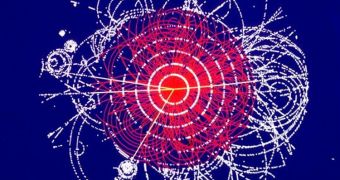The announcement made by officials at the European Organization for Nuclear Research (CERN) on Wednesday, July 4, shook the world of physics, but also triggered a massive response from astrophysicists. They say that the finding, if confirmed, could help reveal the nature of dark matter.
More than 3,000 scientists have been working on countless experiments at the CERN Large Hadron Collider (LHC), the world's largest particle accelerator. These include the three main particle detectors at the facility ATLAS, CMS and ALICE.
Experimental evidence from the former two indicates the discovery of a new force carrier that respects the theoretical properties imposed by the Standard Model on the Higgs boson, the fifth boson in the 40-year-old theory, whose existence would explain most behaviors displayed by subatomic particles.
Now that CERN researchers believe they have found the Higgs (certainty levels for this finding is sigma 5, one step below absolute certainty), astrophysicists are beginning to ponder the implications that this will have on their field, Space reports.
Undoubtedly, the most important effect of this discovery is that scientists could soon learn more about the mysterious nature of dark matter, the elusive stuff believed to make up about 23 percent of the Universe's mass-energy budget, and 83 percent of all matter in the Cosmos.
Though first proposed years ago, the existence of dark matter has yet to be demonstrated via study. Its effects are only noticed through the gravitational pull that it exerts on regular (baryonic) matter.
California Institute of Technology (Caltech) physics professor Harvey Newman believes that the confirmation of the Higgs hints at the existence of a framework for explaining the Universe of which the Standard Model is only a part.
“We can't really deny the existence of dark matter. The Higgs particle that we found doesn't prevent us at all for searching for particles that lie beyond the Standard Model. We still need a candidate for dark matter,” he explains.
“You can think of what we found as the key part of the genetic blueprint of the universe. You remember in 2000 what we all exclaimed and learned about how the genome will lead us to new places,” adds Caltech physics professor Maria Spiropulu.
“This is a good analogy on the road we are down on, in terms of changing things in our understanding,” she concludes.

 14 DAY TRIAL //
14 DAY TRIAL //